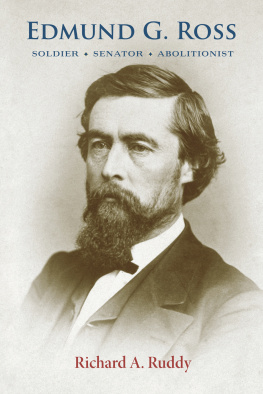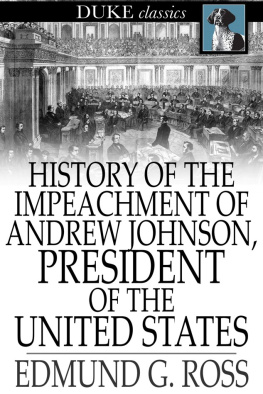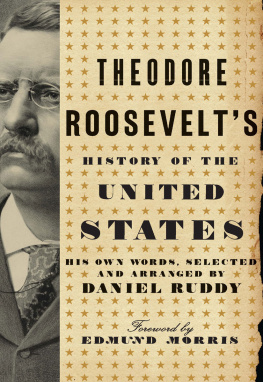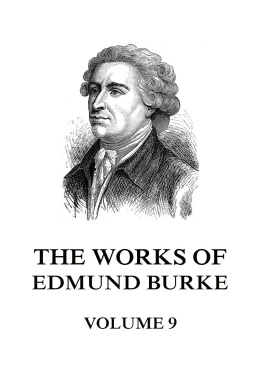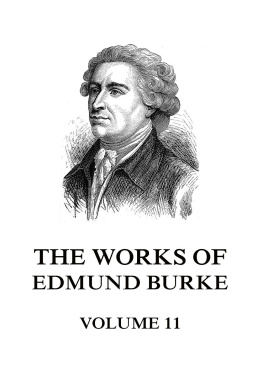Richard A. Ruddy - Edmund G. Ross: Soldier, Senator, Abolitionist
Here you can read online Richard A. Ruddy - Edmund G. Ross: Soldier, Senator, Abolitionist full text of the book (entire story) in english for free. Download pdf and epub, get meaning, cover and reviews about this ebook. year: 2013, publisher: UNM Press, genre: Politics. Description of the work, (preface) as well as reviews are available. Best literature library LitArk.com created for fans of good reading and offers a wide selection of genres:
Romance novel
Science fiction
Adventure
Detective
Science
History
Home and family
Prose
Art
Politics
Computer
Non-fiction
Religion
Business
Children
Humor
Choose a favorite category and find really read worthwhile books. Enjoy immersion in the world of imagination, feel the emotions of the characters or learn something new for yourself, make an fascinating discovery.
- Book:Edmund G. Ross: Soldier, Senator, Abolitionist
- Author:
- Publisher:UNM Press
- Genre:
- Year:2013
- Rating:4 / 5
- Favourites:Add to favourites
- Your mark:
- 80
- 1
- 2
- 3
- 4
- 5
Edmund G. Ross: Soldier, Senator, Abolitionist: summary, description and annotation
We offer to read an annotation, description, summary or preface (depends on what the author of the book "Edmund G. Ross: Soldier, Senator, Abolitionist" wrote himself). If you haven't found the necessary information about the book — write in the comments, we will try to find it.
Edmund G. Ross: Soldier, Senator, Abolitionist — read online for free the complete book (whole text) full work
Below is the text of the book, divided by pages. System saving the place of the last page read, allows you to conveniently read the book "Edmund G. Ross: Soldier, Senator, Abolitionist" online for free, without having to search again every time where you left off. Put a bookmark, and you can go to the page where you finished reading at any time.
Font size:
Interval:
Bookmark:


 Senator
Senator Abolitionist
Abolitionist
All rights reserved. Published 2013
Printed in the United States of America


 MY INTEREST IN EDMUND G. ROSS began in part with John F. Kennedys Profiles in Courage. Even before knowing about the Ross chapter in Kennedys book, I was introduced to a collection of photographs of the Ross family kept in the photo archive at the Albuquerque Museum, where I volunteered after retiring from a thirty-year career as a commercial photographer. I was surprised to learn that the Edmund G. Ross in the photographs, then a territorial governor of New Mexico, was the same person as the United States senator from Kansas featured in Profiles in Courage. I would soon discover that Ross played other roles in late-nineteenth-century America: first as a leader in the abolitionist movement in the years before the Civil War and then through his lifework as a newspaper editor and eloquent observer of the extraordinary times in which he lived.
MY INTEREST IN EDMUND G. ROSS began in part with John F. Kennedys Profiles in Courage. Even before knowing about the Ross chapter in Kennedys book, I was introduced to a collection of photographs of the Ross family kept in the photo archive at the Albuquerque Museum, where I volunteered after retiring from a thirty-year career as a commercial photographer. I was surprised to learn that the Edmund G. Ross in the photographs, then a territorial governor of New Mexico, was the same person as the United States senator from Kansas featured in Profiles in Courage. I would soon discover that Ross played other roles in late-nineteenth-century America: first as a leader in the abolitionist movement in the years before the Civil War and then through his lifework as a newspaper editor and eloquent observer of the extraordinary times in which he lived.Font size:
Interval:
Bookmark:
Similar books «Edmund G. Ross: Soldier, Senator, Abolitionist»
Look at similar books to Edmund G. Ross: Soldier, Senator, Abolitionist. We have selected literature similar in name and meaning in the hope of providing readers with more options to find new, interesting, not yet read works.
Discussion, reviews of the book Edmund G. Ross: Soldier, Senator, Abolitionist and just readers' own opinions. Leave your comments, write what you think about the work, its meaning or the main characters. Specify what exactly you liked and what you didn't like, and why you think so.

